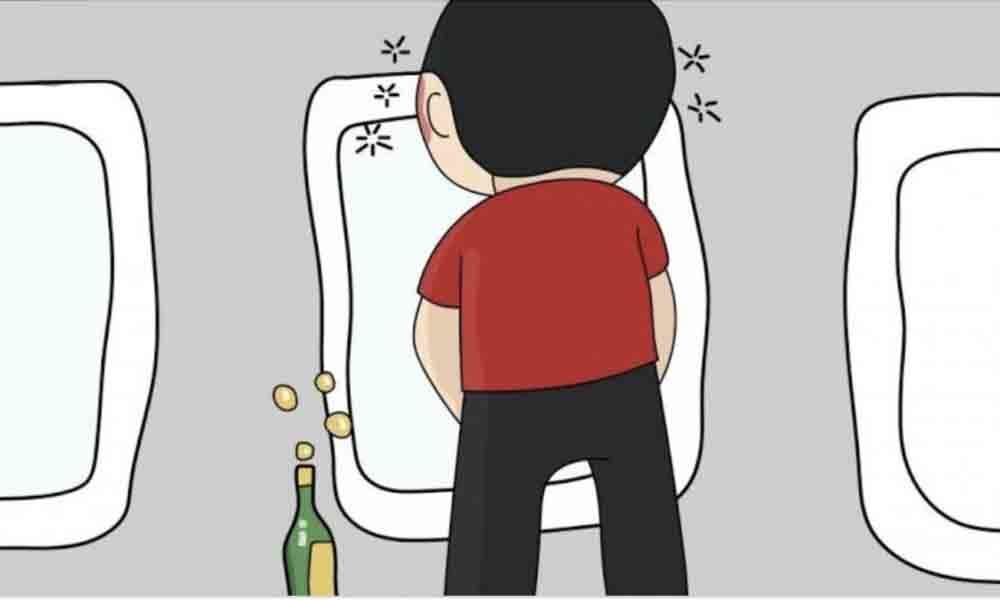Why do you Pee excess when you drink alcohol?

If you feel like you're in the bathroom peeing all the time, a night out can quickly become less fun. Drinking alcohol is a diuretic.
If you feel like you're in the bathroom peeing all the time, a night out can quickly become less fun. Drinking alcohol is a diuretic.
If you drink it, you can pee more than if you had the same amount of water. Read on to find out the science behind why alcohol makes you pee — and what you can do to avoid having to go to the bathroom constantly if anything. How it makes you pee There are a few factors at play that make you feel the need to pee more when you drink alcohol compared to drinking the same amount of water.
Alcohol is liquid and your kidneys know it First, the amount of water in your body is regulated by your kidneys.
They do this by monitoring your blood's plasma osmolality. Osmolality is a fancy word that describes the particle-to-fluid ratio in your blood. Your kidneys tell your body to release more urine if you have more fluid than particles. Your kidneys hold on to fluid when you have more particles than fluid, and you don't feel the need to pee. Because alcohol is a liquid, in favor of more fluid, it tips the osmolality. As a result, the equivalent of what you drink will ultimately be peeled out (assuming your kidneys work well).
Summary Your kidneys are tracking your blood's particle balance to the fluid.
Ultimately, if fluid levels exceed a certain amount, you will pee.
Alcohol is a diuretic The second factor that makes you pee more likely is that alcohol is a diuretic. But what exactly does this mean?
Drinking alcohol inhibits the hormone vasopressin released by the body. Doctors also called anti-diuretic hormone (ADH) vasopressin. In response to an increase in particles over fluids (plasma osmolality), the brain typically signals the release of ADH.
The ADH indicates that your kidneys are holding on to water. Alcohol can cause the kidneys to release more water by suppressing ADH. This can dehydrate your body, which not only makes you pee more but can also cause headaches and later nausea.
Summary Alcohol inhibits the release of a hormone from your body that helps your kidneys work properly.
As a result, your kidneys and body may feel more liquid than they need to release. This can dehydrate you as well.
Factors that can affect the diuretic effects of alcohol Here are a few factors that can affect how much alcohol you pee.
Alcohol strength According to a study in the newspaper Alcohol and Alcoholism, urine output of a person increased when alcohol content increased from 2% to 4% compared to alcohol-free drinks. Another study published in the NutrientsTrusted Source newspaper found that drinking moderate amounts of higher alcohol beverages, such as wine and distilled liquors, had a small diuretic effect.
By comparison, they found lower-alcohol drinks, such as beer, had less of a diuretic effect. How often you drink your body, when it comes to peeing, seems to get used to the presence of alcohol. Therefore, the more often a person drinks, the less alcohol is likely to have diuretic effects.
However, this is no reason to drink more! Just an example of the self-regulation of the body. Hydration before drinking The same study in alcohol and alcoholism reported that people who had been slightly underhydrated before drinking alcohol urinated less than those who had been hydrated, even if they drank the same amount of alcohol. Most research, however, suggests that the bodies of people still respond to alcohol differently. Some people might find that when they drink it they pee more, while others pee less. What about the seal breaking? "Breaking the seal" is a term that a person pees when they drink alcohol for the first time. Some people believe it makes them pee more frequently when a person breaks the seal. As a result, they're trying to keep on peeing until they have to go absolutely.
The idea that breaking the seal is a real thing is not supported by research. Rather, when drinking, doctors suggest the theory may be more of a mental suggestion to a person. If you think you're peeing more when breaking the seal, you'll probably start thinking more about going to the bathroom and therefore pee more often.
Generally speaking, resisting the urge to urinate when you feel you need to go is not a good idea. Holding it in repeatedly may increase your risk of infection with the urinary tract (UTIs) and affect your bladder-brain connection if you need to pee.
Bearing in mind the factors affecting alcohol and having to pee, here are the most common ways you can manage the need to pee:
drink beverages with a lower total content of alcohol.
Drink a glass of wine instead of a hard liquor cocktail,
for example. Do not be slightly dehydrated in order to pee less.
It's not an overall great plan as dehydration is likely to only make you feel worse later.
Do a moderate drink.
If you don't have as much alcohol in your body and bladder, you won't have to pee as much.

